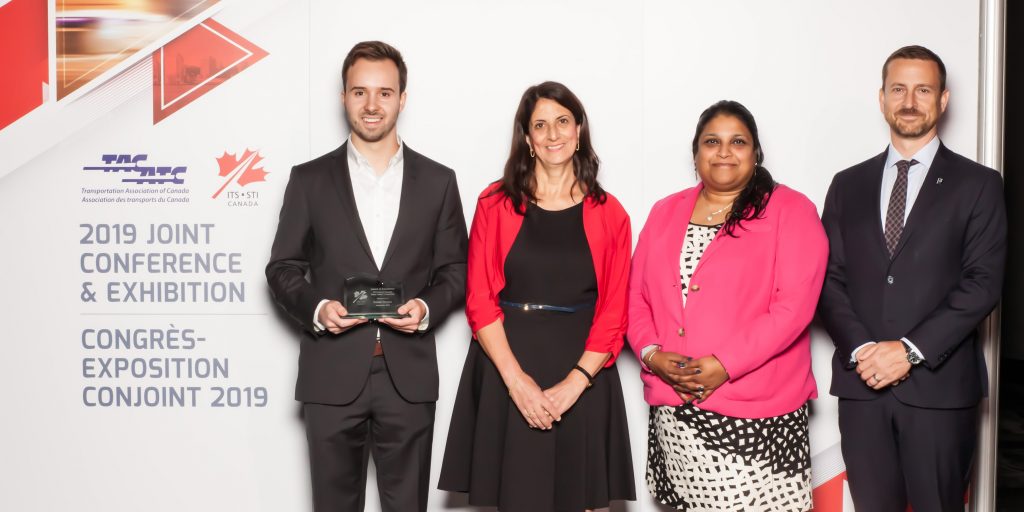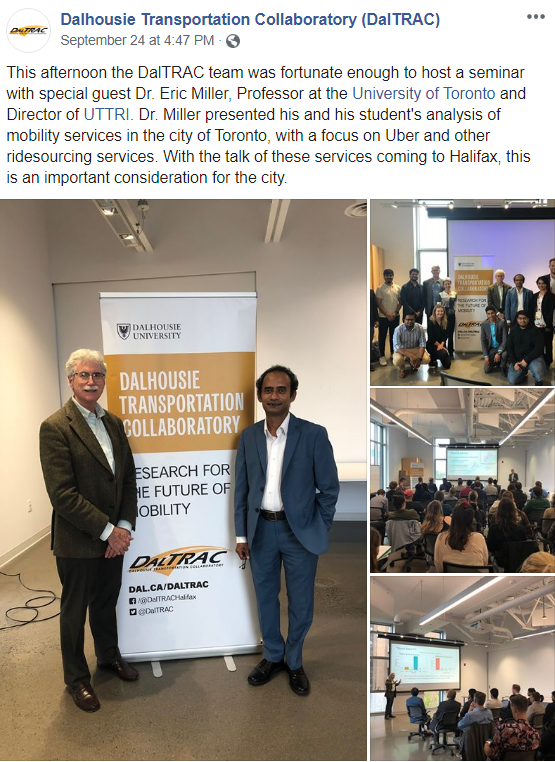The Transportation Association of Canada (TAC)-ITS Canada Joint Conference and Exhibition took place in Halifax September 23-25, 2019.
UTTRI associated faculty Professor Baher Abdulhai presented “Academic research needed for automated and transformative transportation optimization: iCity-CATTS plan and early results” on September 24 as part of the session “What academic research is needed for future transportation deployment optimization?” Professor Ilham Benyahia of the Université du Québec en Outaouais (UQO) moderated.

The boldest vision for smart transportation is autonomous, green,pervasively connected and shared. While key emerging disruptive technologies and services (e.g. driving automation) are rapidly advancing, there are many unanswered questions and contradicting predictions of futures of cities. There is an urgent need for a structured interdisciplinary research program to address the city scale effects. Our research focuses on quantifying the impacts and exploiting such technologies to maximize the benefits to Canadians while avoiding potential risks and pitfalls.
Ahmed Aqra (CivEng PhD candidate, supervised by Professor Baher Abdulhai) gave a talk called “A management framework for sharing-economy services in a Smart City” on September 24 in the “Smart City Challenge: Practical applications” session moderated by Rod Schebesch, Senior Vice President, Transportation, and Smart Mobility North American Lead, Stantec. Aqra also presented “Highway traffic characteristics estimation using deep convolutional neural network” in the “Artificial Intelligence and machine learning for Smart Mobility” session on September 25, which was moderated by Barry Pekilis, ITS Thrust Leader, National Research Council.
UTTRI Executive Director Dr. Judy Farvolden‘s September 24 talk “Where is evidence-based decision-making without data?” was included in the session “Transportation data sharing workshop: balancing public and private needs” moderated by Ken Moshi of Transport Canada.

New operators offering new services like ride hailing, ride sharing and eventually connected and automated and vehicle are disrupting the transportation sector. Thank goodness, because “business-as-usual” transportation is unsustainable. How will we ensure we have access to the data we need to understand how we should integrate, regulate, encourage, or restrict new services to achieve maximal economic, environmental and social benefits?
On September 25, UTTRI Director Professor Eric Miller presented “Agent-based microsimulation travel demand modelling incorporating autonomous vehicles and mobility services” in the session “Transportation demand modelling” moderated by Éric Martel-Poliquin of Ministère des Transports du Québec.

New mobility services are disrupting transportation systems in ways that have not been experienced since the introduction of the automobile over a hundred years ago. They also pose unprecedented challenges to current travel demand models. This paper presents a framework for “next generation” models to deal with these new technologies and services.
Professor Miller also visited the Dalhousie Transportation Collaboratory (DalTRAC) while in Halifax and presented a seminar there at the invitation of DalTRAC Director, Professor Ahsan Habib. A screen shot of their Facebook post about his visit is shown below.
Daniel Olejarz (CivEng 2020 MASc candidate) presented his winning ITS Canada 2019 Student Essay Competition paper, “Monitoring Toronto’s King Street Transit Pilot – A Case Study of ITS Applications” at the ITS Canada AGM, and received a prize at the Awards Lunch.

Read or download Daniel’s winning essay, “Monitoring Toronto’s King Street Transit Pilot”.

